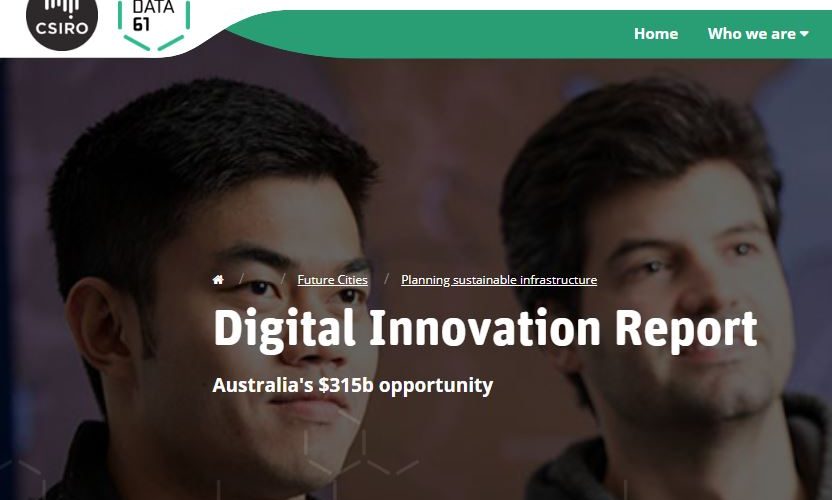Digital Innovation: Australia’s $315b opportunity.
The new report from Alpha Beta for CSIRO/Data61, called “Digital Innovation: Australia’s $315b opportunity” identifies eight strategic areas where Australian businesses can succeed in creating new digital products or services. These opportunities are precision healthcare, digital agriculture, data-driven urban management, cyber-physical security, supply chain integrity, proactive government, legal informatics and smart exploration and production.
Staff will be a big part of your business’ success – if you hire right. Staff can also be the hiccup or headache you don’t want. Research states that a bad hire costs ‘at least’ $25,000. But the pain goes beyond cash.
Obviously, it has some limitations. A big one that we noticed is that it only checks ‘competence’ not ‘character’. This is an important difference because research says that 1 in 4 fail pre-employment integrity testing. The flip side is that integrity is found to empower performance and prosperity.And that is the exact issue that was identified in the Innovation Report.
Unfortunately exemplified through three Royal Commissions – Institutional Abuse, Banking, and Aged Care – the Commissioners have said, are saying, and will say that Integrity / Screening checks are important to safeguard people and to generate community trust. As noted in the Report, Australia is now being characterised as having a “low institutional trust and rising civil expectations.”
In other words, society does not trade in loyalty anymore, it trades in trust.
When we scan the integrity checking horizon, we see that integrity checking is haphazard and often ineffective. Contributory facts include:
. under-resource of personnel (skills, experience and people)
. slow to process cases (eg. complex cases on average take 792 days, WWCW have 4,000 blue cards applications backlogged while those people still work with children).
. bias interviewers & analysis (eg. a vetting officer whose brother died of an overdose is not going to be unbiased towards an ex-drug dealer.)
. disparate methods & sources used (varying from state to state, industry to industry, product to product)
. standards and thresholds are not consistently applied (what is considered adverse information various from industry to industry, as does the degree of seriousness etc and most do not use the ‘Whole of Person’ approach.)
. discriminatory (1 in 4 complaints to the Human Right Commission is due to criminal history discrimination)
. do not quantify relevant suitability indicators (eg. The grading of one’s Honesty and Trustworthy, using a 1-to-5 metric)
. occasional police checks used by recruiters. National Police checks are used in some areas/sectors, but research has shown them not to be adequate to safeguard people and information, in of themselves.
. relaxed attitudes: finding a needle in the haystack is too difficult. Until you get pricked by the needle, that is.
Enter Digital Innovation:
Imagine for a second that your organisation could readily access an affordable AI Vetting Officer? Imagine that you could have your shortlisted Candidates go through a background screening interview, identifying past counter-productive workplace behaviours, illegal drug use etc and then return a character assessment Result: “Favourable, Caution, Adverse” to you, the next day? Would it enhance your hiring decisions? Might it generate trust within your workplace as everyone had ‘passed’ the test? Could it exude trust to your customers and society in general?
An “AI Vetting-As-A-Service” (VAAS) can do exactly that and much more. It is a product that will “accelerate decision cycles” from years and months down to hours and seconds. It also satisfies the requirement to be responsive and is evidence based. In contrast, an automated police check offers a fraction (1/21st) of the dimensions that a VAAS product covers. There is a lot of risk that remains unchecked – some use the illustration of hiring a ticking time bomb. Other black mark database check products (eg. WWCC) makes decisions with very little citizen involvement – therefore natural justice is either denied or delayed until an appeal or a court evaluates the decision (again lengthy delays and costs ensue for all parties). The difference with a VAAS product is that the citizen is a vital and essential contributor of the information, an important corroborator and is centrally involved in the process.
In response to the low trust environment we find ourselves in, governments at all levels are scrambling to legislate, implement and coordinate more and more suitability clearances / integrity checks. eg. Working With Children Check (WWCC), NDIS Clearance, Airport (ASIC) Check, Elderly Persons Check, there is talk of GP & Staff to gain personnel suitability checks to have access to the Digital Health IT System etc etc).
The challenge as noted in the Report is the potential for a weak “regulatory and ethics framework”. Furthermore, standardising methods, information and standards used to determine a person’s character and trustworthiness is far from strong. For example, a valid and current state-based WWCC Holder cannot work with Children in other states. The good news is that the Attorney General declassified its suitability standards and processes for clearances in 2010. It can easily be adopted as the basis of all integrity checks as part of its regulation compliance. Then the organisation can customise additional “organisational suitability elements” as required. (Did someone say #RegTech?)
If trust is now society’s commodity of choice, then having a VAAS Suitability Clearance that the public sector, not for profits and businesses can access, will build confidence amongst citizens and the community at large. It will also generate the required trust by effectively screening malicious insider threats – by knowing, really knowing, the people you hire.
Conclusion:
Contact us today on (02) 61-71-41-71 to discuss your staff, contractor and partner integrity requirements, so you can join the Digital Innovation wave.
More articles that maybe of interest:












